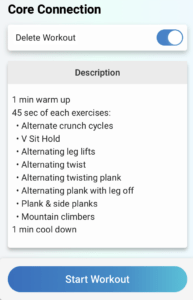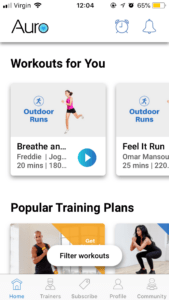This is the first in a series of firsts. I, FitPro’s bright-eyed and bushy-tailed new editorial assistant, will run headfirst into the world of fitness, from classes, to gadgets, to trends. Why? To feel. I will feel mostly pain, so you know what new clients are experiencing before, during and after. Here, I tried Auro – the personal trainer in your ear.
It’s worth noting that I am not a man of flawless health. Three years of university, pints of snakebite and overall limited movement, have made me look like a Plasticine version of what a 23-year-old man should look like. But that changes, today, with Auro whispering words of encouragement in my ear.
I selected Core Connection, a 15-minute, beginner, core, HIIT workout, set to dance music that would burn me 100 calories. It’s run (and voiced) by Jane Wake, celebrity personal trainer and former FitPro editorial assistant; a hallowed position if ever there was one. She was also at this Auro event to run a warm-up and have a chat with us afterwards.

15 minutes doesn’t sound like a lot, but this, I assure you, was a fair amount
Beer belly blast

My anxiety had anxiety on the way to the class. The regret of being a slob for three years was as strong as the shock of an 08:30 workout – but this wasn’t necessary as, to its credit, there is plenty to be said for this little app.
The benefit of Auro is that, being an app, it puts you in control somewhat. It takes care of any issues of laziness or ignorance by providing the workout and the explanation as you’re doing it. Then, by being able to select your experience level, the workout you’ll be doing, and even what PT will be in your ear, you’re provided with some sort of solace for the pain they’re about to put you through. It’s the small victories.
The explanations of different exercises and the time that you’re given to prepare worked for me. Wake (the recorded version) was conversational to the point where it didn’t seem forced, and when she allowed us an extra 15 seconds of rest, it was a genuine gift. For that, I thank you, Jane.
While images before the workout begins may help in cases where clients aren’t aware of what something is, Auro founder Anta Pattabiraman has said that these are on their way.

Thank you, Auro. I am healthy now
Bang for your buck
Pragmatically, as someone who can’t afford a personal trainer, the app resonates. With 50 new classes being added a month by an array of PTs, all for different needs and with different levels of gear, from nothing to weights to machines, there is a growing catalogue of workouts that will define Auro. At a basic rate of £8 a month, there’s definite bang for your buck here.
Speaking about the app, Wake said, “It doesn’t replace a personal trainer, but the whole point of Auro is that it’s really affordable for everyone. I think it fills a massive void and it’s about making things accessible to more people.”
She added, “The whole point of Auro is it’s a constantly changing thing. It can bridge the gap to having a PT, or it might be that you have one that you see once a week or once a month – Auro can complement that. There’s loads of different ways of working it in.”
The true use of Auro may be for people just getting into fitness: exposing clients to workout routines with the help and motivation of a trainer but without the price. As a motivational tool, this may be as effective as it gets without having someone physically there to push you.
“Whether it’s a Fitbit, a heart-rate monitor, whatever, we know monitoring tools work – but we also know that they are limited to a certain extent.
“People get used to them and then they almost start predicting what their heart rate is or however many steps they’ve done, so there is a limitation to that as a tool or motivational aid. I think that’s where Auro can be so brilliant,” concluded Wake.
Robots don’t replicate reality

The problem with Auro is that it will never replace having a personal trainer there. While this will (probably) just mean less motivation or bespoke workouts for exactly what you want, where it will truly fall short is in injury prevention. With no one to physically correct your form and (currently) no images of how exercises should be performed, injury to clients could be a problem.
Practically, the app is good, a strong seven out of 10. Can I be bothered to research my own workouts when I know nothing about what is good for me? No. These are workouts with specific things in mind, put together by quality PTs. They’re delivered in a friendly way – a nice stranger telling me what to do, but in an enthusiastic, kind way – even though it hurts.
But what the app can’t account for is my stupidity. What happens if I ignore the PT perfectly explaining an exercise and how not to get it wrong, throwing in a joke or two to calm me before the storm? As I lay there on the floor, back spasming into abstract shapes, Auro can’t help me.
So, final thoughts?
Auro is great for someone who wants to get into fitness but is too lazy to get up and figure out how to do it for themselves. If that is done in a gym, where you hope that someone will help you if you’re doing something wrong and not just video it and put it on Twitter with the caption ‘gym idiot’, then this is an app that can motivate and educate.
Whether that takes you to designing your own workouts and moving on alone, continuing through to the more advanced levels and enjoying the wealth of options that the app has, or pushing you to go and get a PT for the complete experience, Auro could well be a tool that helps people get fit.
Unlike Roy Batty in Blade Runner, Auro isn’t a bad robot, but just don’t hurt yourself, for it won’t help you.







